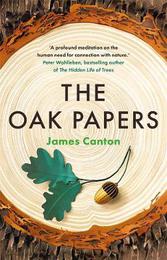
|
The Oak Papers
Paperback / softback
Main Details
| Title |
The Oak Papers
|
| Authors and Contributors |
By (author) James Canton
|
| Physical Properties |
| Format:Paperback / softback | | Pages:256 | | Dimensions(mm): Height 208,Width 136 |
|
| Category/Genre | The environment
Trees, wildflowers and plants |
|---|
| ISBN/Barcode |
9781760642594
|
| Classifications | Dewey:583.65 |
|---|
| Audience | |
|---|
|
Publishing Details |
| Publisher |
Black Inc.
|
| Imprint |
Black Inc.
|
| Publication Date |
17 August 2020 |
| Publication Country |
Australia
|
Description
From one man's improbable dedication to a rural oak tree springs a subtle, intimate and moving meditation on humanity and our relationship to the natural world. Oaks are born and die on the same patch of earth. It is that sure-footedness that is so appealing. Ancient oaks hold a powerful sense of the longevity of life. The sense of security, of attachment to place, enchants us. You can stand beneath a grand oak and know that your more distant ancestors did so too. This is the story of one man's relationship to an ancient tree, the Honywood Oak. Colossal and wizened, it would have been a sapling when the Magna Carta was signed in 1215. James Canton spent two years sitting with and studying this unique tree. It was an exercise in discipline- he needed to slow down in order to appreciate it fully, to tune in to it, to connect with the ecosystem that lives around, inside and under it. In this stunning, meditative treatise, he examines our long-standing relationship with trees, a material as well as a source of myth and legend, and of solace. We no longer build our houses from the sturdy oak and its relatives, use them to fuel our fires or grind their seeds and nuts into flour in times of famine. Physically, we don't need them. Or do we? The natural world has lessons for us - if we slow down enough to listen.
Author Biography
James Canton teaches the Wild Writing MA course at the University of Essex. The author of Out of Essex- Re-Imagining a Literary Landscape, which was inspired by his rural wanderings, he also runs workshops on writing nature and landscape. His work appears widely, including in The Times Literary Supplement, and he is a regular commentator on television and radio.
|